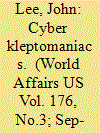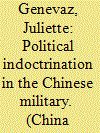| Srl | Item |
| 1 |
ID:
125219


|
|
|
|
|
| Publication |
2013.
|
| Summary/Abstract |
When President Obama expressed "serious concern" about the cyber espionage being conducted against America by its "enemies" in his February 12th State of the Union message, he did not name names. But the statement came just two days after leaks from a US national intelligence estimate identified China as the most serious culprit. In recent months, the administration has been more direct. During his summit with China's new President Xi Jinping in California in early June, Obama elevated commercial cyber espionage to one of the two leading issues (a nuclear-armed North Korea being the other) that divide the two countries. Secretary of Defense Chuck Hagel had struck a similar chord a few days earlier at his opening address at the Shangri-La Dialogue meeting of defense ministers in Singapore, when he referred bluntly to the Chinese state and military entities that are stealing commercial secrets from American firms in cyberspace. And, in a speech to the Asia Society in New York in March, outgoing national security adviser Thomas Donilon said that cyber espionage by state-based or state-funded entities is now at the "forefront" of American-Chinese relations, adding that "US businesses are increasingly speaking out about their serious concerns about sophisticated, targeted theft of confidential business information and proprietary technologies through cyber intrusions emanating from China on an unprecedented scale."
|
|
|
|
|
|
|
|
|
|
|
|
|
|
|
|
| 2 |
ID:
192403


|
|
|
|
|
| Summary/Abstract |
People’s Liberation Army (PLA) related business was rampant in China in the 1980s and 1990s, and they significantly disrupted the local economy. However, due to limited data about PLAs, this issue is rarely investigated and thus the negative impact is hardly measured. In this paper we introduce a new proxy for measuring the approximate level of PLA related business in a specific city, PLA hospital score, to identify cities that are more affected by PLA related business closure. We then employ a difference-in-differences (DID) framework and show that PLA related business closure does bring positive effects to China’s local economy, about a 2% increase in GDP growth per year. We also find that this effect is more significant in cities with median economic size and cities that rely more on secondary and tertiary sectors. We finally provide a possible channel of this effect, which mainly works through providing a more efficient and competitive market to local private firms as well as an investment-friendly environment that attracts foreign investments.
|
|
|
|
|
|
|
|
|
|
|
|
|
|
|
|
| 3 |
ID:
151964


|
|
|
|
|
| Summary/Abstract |
This article examines the role played by the political indoctrination of the Chinese People’s Liberation Army (PLA) during China’s socio-economic reforms of 1987–2007. This period was a time of political transition during which the Chinese Communist Party transformed its ideology from a focus on revolution to a self-proclaimed unrivalled single-party regime. This article looks at how the party conveyed this ideological change to the armed forces. One of the four PLA general headquarters/departments, the PLA General Political Department (中国人民解放军总政治部), was responsible for the indoctrination of servicemen and -women. Examining the work of this agency over the 20 years following its major ideological effort in 1987, this article challenges the dominant literature according to which political indoctrination hinders military professionalization. The crux of this argument is that the General Political Department’s purpose behind indoctrination of the armed forces was not only to assert party control but also to build esprit de corps. Based on a series of previously untapped periodicals published by the General Political Department, this analysis contributes to understanding processes of authoritarian resilience in the contemporary Chinese state.
|
|
|
|
|
|
|
|
|
|
|
|
|
|
|
|
| 4 |
ID:
166813


|
|
|
|
|
| Summary/Abstract |
In the spring of 1959, the Tibetan public in Lhasa, the capital of Tibet, rose up in peaceful protest against Chinese rule. The uprising was brutally rushed by the occupying People’s Liberation Army (PLA). PLA documents record that in the spring and summer of 1959 alone 87,000 ‘rebels were eliminated’ in central Tibet (Smith 1996, 451). These documents do not include those Tibetans killed by the PLA in Kham and Amdo in eastern and north-eastern Tibet.
|
|
|
|
|
|
|
|
|
|
|
|
|
|
|
|